课程网站的设计与实现(含录像)
无需注册登录,支付后按照提示操作即可获取该资料.
课程网站的设计与实现(含录像)(毕业论文说明书12000字,程序代码,SQL2000数据库)
摘要
当前,大多数的课程网站管理员和统计人员仍主要使用传统的手工工具。这种工作方式工作量大、效率低、易出错、准确性差、及时性差,而且有大量数据需要存档,查找麻烦。为了使管理人员从繁琐的手工劳动中解脱出来,提高工作人员的工作效率,降低管理成本,节约存储空间,开发一个课程网站十分必要。
本系统采用B/S模式:与传统的C/S模式相比,B/S结构把处理功能全部移植到了服务器端,用户的请求通过浏览器发出,无论是使用和数据库维护上都比传统模式更加经济方便。而且使维护任务层次化:管理员负责服务器硬件日常管理和维护,系统维护人员负责后台数据库数据更新维护。采用B/S模式,突破传统的文件共享模式,为学习交流平台的设计提供新的解决方案。借助asp.net的WEB应用程序,用户通过Browser软件连接后台数据库并完成做操作,将原有静态网页的形式升级到动态更新数据的方式。B/S模式平台,数据维护方便客户端无需专用的软件,有较好的网络扩展性,支持TCP/IP协议直接接入Internet,。同时对于B/S模式而言,程序和数据的物理位置已经不再是那么重要了,访问者所关心的只是它们的URL就可以了。
本系统使用ASP.net技术:ASP.NET是把基于通用语言的程序在服务器上运行。不像以前的asp即时解释程序,而是将程序在服务器端首次运行时进行编译,这样的执行效果,当然比一条一条的解释强很多。 数据库采用sql server2000数据库:具有良好的安全性能,防火墙技术可以保证后台数据库的安全性,如果结合Windows 2000与Internet Information Server的高度安全性,使用户可以实现系统的安全。
关键词 b/s,课程网站,asp.net,sql server2000
Abstract
At present, most of the course website administrator and statisticians still mainly use the traditional manual tools. This way of working volume, low efficiency and error-prone, accuracy, timeliness is poor, poor and has large data need to archive, find trouble. In order to make the management personnel from tedious manual labor freed, improve work personnel's working efficiency, reduce the management costs, to save storage space, develop a course site is necessary.
The system USES the B/S mode: and the traditional C/S mode, B/S structure compared to the processing function all transplantation, and the user's request server via a browser, both use and database issued on the maintenance of the traditional mode than more economic convenient. And make maintenance tasks hierarchic: officer is responsible for the server hardware daily management and maintenance, system maintenance personnel responsible for backend database data update maintenance. Adopts B/S mode, the breakthrough tradition file sharing mode, the design for learning communication platform provides a new solution. With asp.net WEB applications, users connect the backend database software is clicked and finish do operation, the original static webpages upgrade to dynamically update and data way. B/S model platform, data maintenance convenient client without special software, and have a good network expansibility, support TCP/IP protocol direct access to the Internet,. As for B/S model is concerned, programs and data of physical location is no longer so important, visitors concerns about just their URL.
This system using asp.net technology: the ASP.NET is based on general language program in the server. Unlike previous asp real-time interpretation process, but in the server program compiled first run, so that the implementation of the results, of course, a explanation than a much better. Using SQL database server2000 database: good safety performance, firewall technology can guarantee the safety of the backend database, if combined with Windows 2000 and Internet Information Server height safety, users can realize the security of the system.
Keywords :b/s, the course website, asp.net, SQL server2000
需求分析
2.1.1 系统功能需求分析
课程网站是一个典型的数据库开发应用程序,本系统工作的任务主要由以下2部分组成
(1)教师
演示课件管理,课程课件管理,首页简介,学校公告管理,作业资料管理,留言管理。课程概况,密码管理等内容。
(2)学生用户
学校公告查看,作业资料查看,演示课件下载,课程课件下载,课程概况,网上答疑。
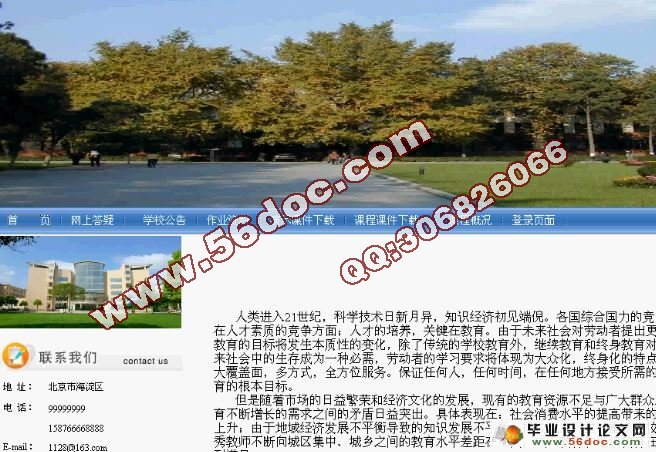
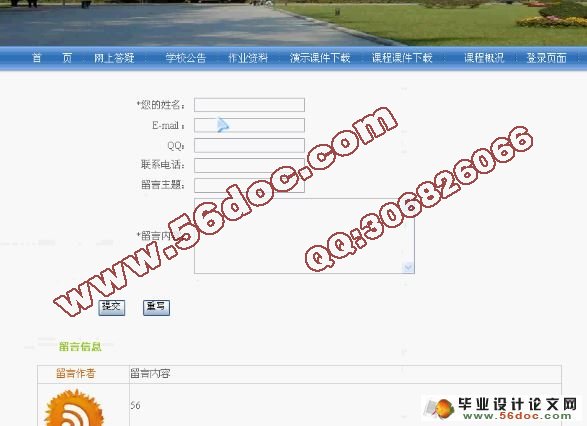
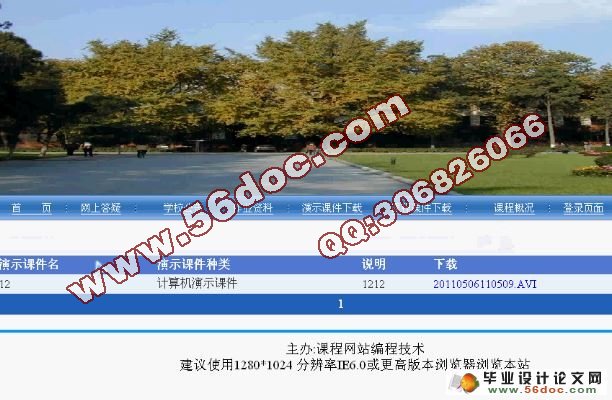
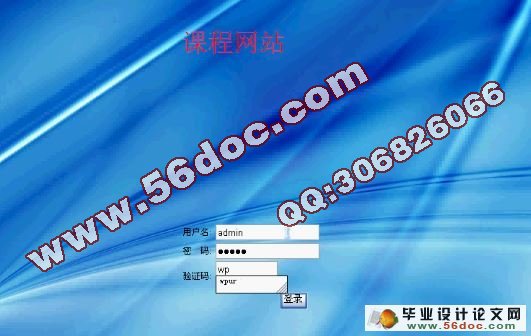
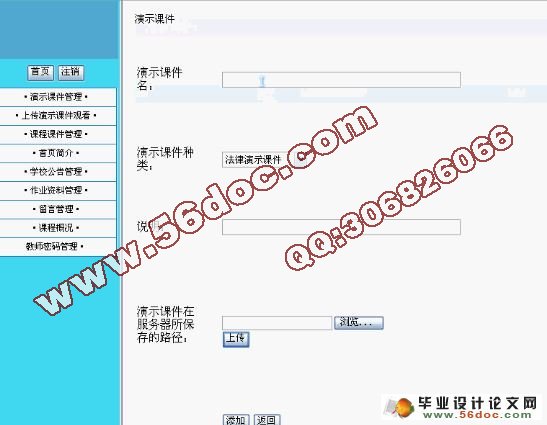
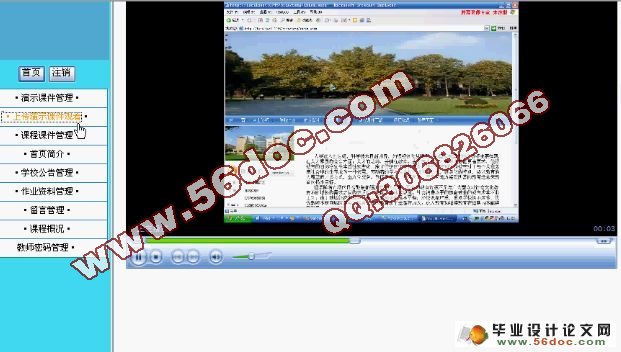
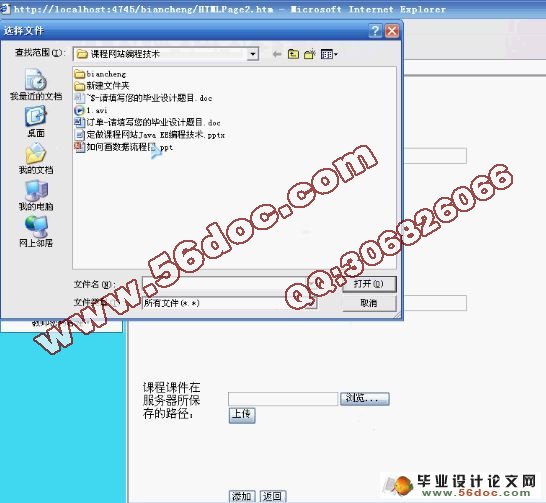
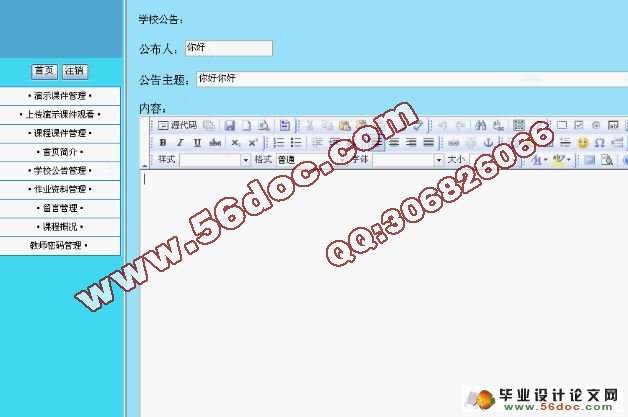

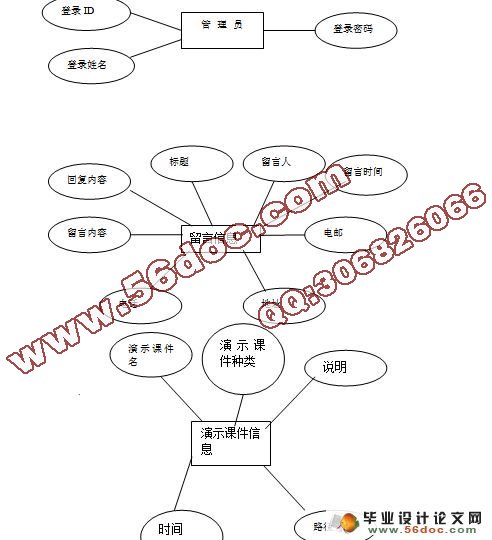

目录
摘要 1
Abstract 1
第1章 绪论 3
1.1 项目背景 3
1.1.1 课程网站的现状 3
1.2 研究的目的和意义 4
第2章 需求分析与技术分析 5
2.1 需求分析 5
2.1.1 系统功能需求分析 5
2.1.2 系统设计结构分析 6
2.2 技术分析 8
2.2.1 目前主流的动态网页技术比较 8
2.2.2 asp.net简介 9
2.2.3 sql server2000简介 10
第3章 项目的实现与设计 11
3.1 课程网站大体结构图 11
3.2 数据库概念结构设计 12
3.3 数据详细设计 15
第4章 系统的实现 18
4.1 管理员管理页面 18
4.1.1. 连接数据库的包含文件 18
4.1.2 后台管理的控制台 18
4.1.3 首页简介管理 19
4.1.4 密码管理 20
4.1.5 学校公告管理 21
4.1.6 学生留言管理 23
4.1.7 演示课件添加 24
4.1.8 课程概况 25
4.2 前台系统的实现 33
4.2.1 首页 35
4.2.2 学生留言页面 36
4.2.3 学校公告 36
4.2.4 演示课件下载 37
4.2.5 课程概况 38
4.2.6 登陆页面 38
第5章 系统的调试和优化 40
5.1 调试 40
5.2 问题分析 41
第6章 结束语 42
致谢 43
参考文献 44
附录 45
附录1:动态网页设计代码 48
